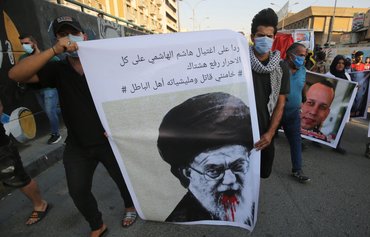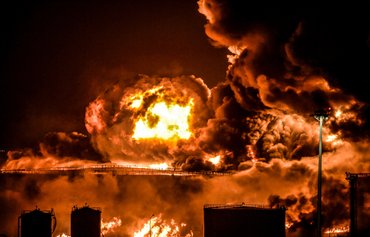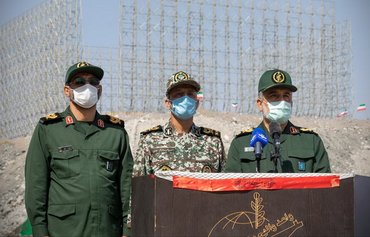When newly elected Iranian President Ebrahim Raisi takes office in August, he will inherit a government isolated on the international stage and reviled by many at home.
The reason for this situation is clear: years of destabilising actions and decisions by the regime and the Islamic Revolutionary Guard Corps (IRGC).
Iran has suffered major political and economic consequences for its drive to expand its nuclear programme and to continue its interventionist and expansionist policies through proxies in Iraq, Syria, Lebanon and Yemen.
World powers that are party to the 2015 nuclear agreement, known as the the Joint Comprehensive Plan of Action (JCPOA), have repeatedly called on Iran to return to compliance, but the regime continues to aggravate the situation.
![A Yemeni fighter aligned with the Iran-backed Houthis stands guard in Sanaa on January 25. The Houthis have carried out a series of attacks on Saudi oil installations in recent years. [Mohammed Huwais/AFP]](/cnmi_di/images/2021/06/24/30468-yemen-houthi-guard-600_384.jpg)
A Yemeni fighter aligned with the Iran-backed Houthis stands guard in Sanaa on January 25. The Houthis have carried out a series of attacks on Saudi oil installations in recent years. [Mohammed Huwais/AFP]
![A group of retired government workers protest in Iran in March. [ILNA.ir]](/cnmi_di/images/2021/06/24/30469-Iran-public-protest-600_384.jpg)
A group of retired government workers protest in Iran in March. [ILNA.ir]
In the latest warning, the United Nations (UN) nuclear watchdog in May voiced concern that Iran had not clearly answered queries over possible undeclared nuclear activity, adding that its enriched uranium stockpile was 16 times over the allowed limit.
Earlier, leaders expressed "grave concern" over Iran's stated plans to boost uranium enrichment up to 60%, bringing it closer to the 90% purity threshold for military use and shortening its potential "breakout time" to build an atomic bomb.
The world community has also called on Iran to halt its ballistic missile programme.
Regional aggression
Saudi Arabia has regularly come under attack from Iranian missiles that Houthis across the border in Yemen launched with IRGC-supplied weapons.
In the latest attack, Saudi air defences on June 19 intercepted 17 explosives-laden drones that Houthis fired at the kingdom, the most in a single day since the conflict began.
Kuwait, the United Arab Emirates and Bahrain in March joined Saudi Arabia in denouncing cross-border attacks mounted by the Houthis on the kingdom.
Saudi King Salman bin Abdulaziz had in November called for "a decisive stance from the international community against Iran that guarantees a drastic handling of its efforts to obtain weapons of mass destruction and develop its ballistic missiles programme".
Iranian missiles also have figured in a string of attacks targeting international coalition forces, diplomatic facilities and military convoys in Iraq and Syria.
Since the beginning of the year, a total of 43 attacks have targeted military bases housing international coalition troops, foreign embassies and Iraqi convoys carrying logistical support, the latest of which on June 20 when a rocket attack targeted Ain al-Asad air base in Anbar province.
Iraqi officials have condemned the activities of IRGC-backed militias, which have carried out assassinations in Iraq and have been linked to the disappearance of activists.
Their flagrant disregard for the rule of law and for the authority of the state has led prominent clerics, officials and regular citizens to call for their dissolution.
Top Iraqi Shia cleric Ali al-Sistani has repeatedly called for paramilitary groups to disband and join Iraq's national army.
On his first official visit to Iraq last September, French President Emmanuel Macron called for all armed forces in Iraq to be "normalised", stressing that the "fight for Iraq's sovereignty is essential".
Anger at IRGC
Inside Iran, the IRGC's repression has fomented public anger.
Since the start of the 1979 Islamic revolution, the Iranian regime has used the IRGC to intimidate Iranians and suppress popular protests.
Following mass protests that began in November 2019 over a steep increase in the price of gasoline, IRGC troops and the affiliated Basij Resistance Force attacked protesters in Tehran and in 30 Iranian provinces.
Videos posted on social media from inside Iran showed the IRGC and other forces shooting unarmed protesters, including in Mahshahr in southern Iran, where the majority of Iran's ethnic-Arab population lives.
In recent years, Iranians have expressed their disapproval of the IRGC and the regime by tearing up photos of Iranian leader Ali Khamenei during protests and by chanting slogans against the IRGC and affiliated forces.
The IRGC "may not be engaging in genocide" in the Middle East, "but it is definitely violating the human rights of people" across the region, said Shahin Mohammadi, a US-based Iranian journalist.
Inside Iran, the IRGC also serves as "an instrument of repression", he said.
The Iranian people are also angry at the regime and the IRGC for exacerbating the massive economic crisis facing the country.
While the public faces massive unemployment, skyrocketing inflation and decreasing standards of living, the regime spends its dwindling resources on the IRGC, its regional proxies and its nuclear programme.

![Iran's President-elect Ebrahim Raisi is pictured during his first press conference in Tehran on June 21. [ATTA KENARE / AFP]](/cnmi_di/images/2021/06/24/30467-000_9cq6mw-600_384.jpg)






